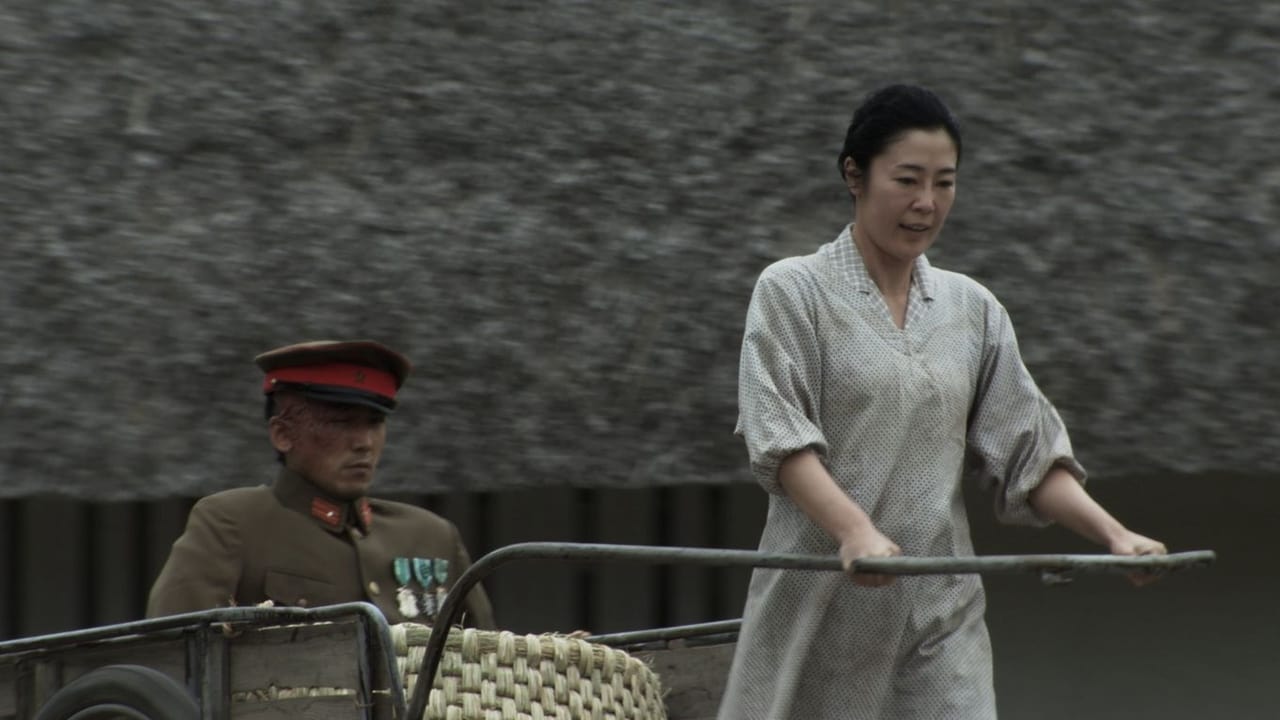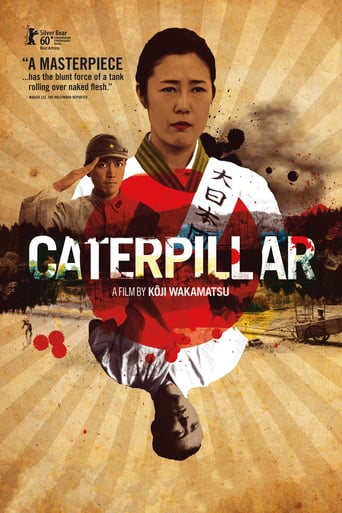

The film is full of flashbacks, and one of the early ones was of Kyuzo and all the village dressing up for his departure from the village into the military.Most of the film takes place after Kyuzo is a veteran of the war between China and Japan around the time of World War II. He lost both legs and both arms in combat, his head is about 40% burned, and he is deaf. His speech is adversely affected by the lack of hearing.His wife Shigeko is horrified with this from the start. She tries to strangle him, but does not have the strength. The villagers honor Kyuzo and his achievements, such as they were, in China. They encourage Shigeko strongly to take care of the hero, the War God.Shigeko learns to deal with his eating, waste, bathing, and sexual functions. She takes care of him, which is an large daily effort, an enormous effort over an interval of years. She also works in the rice fields with the other villagers during the day.He tries to learn to write/draw with his mouth and pencil, starting with 'I want to do it.'She parades him around the village dress in uniform and medals. Sometimes she leaves him in the cart to watch her work in the rice fields.About half way through the film, she really gets into being the put-upon wife, and insists on his performing his responsibilities as well. She gets lots of attention for this, and he gets a taste of all the work (done by others) that he generates. Also, she becomes very conscious of the fact that he can no longer beat her. After some time in this steady state, Kyuzo starts having bad memories of what he did in China. Plus his obligations as War God never seem to go away.By 1945, the war started to come to Japanese soil. The radio in Japan reports something entirely different. Shigeko starts getting inwardly discouraged with the horrible things that have happened. Kyuzo has more flashbacks of his bad deeds in China.Toward the end of the war, she needs satisfaction, but he has trouble even being aroused, since he's too obsessed with the bad memories. She slings back in his face the horrible things he said to her before he left for war. At one point, just seeing the flame in their evening lantern brings back the memories of rotten things he did, and how he lost his limbs. This is when she sings a song about a caterpillar, which is what her husband reminds her of.-----Scores-----Cinematography: 7/10 Archival footage was in out of focus sepia; in other words, it sucked rocks.Sound: 8/10 OK, but not great.Acting: 9/10 Fine.Screenplay: 8/10 The story hangs together well. More cohesion about the flashbacks would have been nice.
... View MoreThough he's not credited, this film seems to be based on a story by Edogawa Rampo, which has previously been adapted in the anthology film Rampo Noir. This film transports the story to the WWII era. Keigo Kasuya returns home from the Second Sino-Japanese War in 1940 a quadruple amputee - no arms, no legs - without the ability to speak. His wife (Shinobu Terajima) is reviled, but soon falls back into her position as loyal spouse. The film examines the patriotic fervor of the times - Kasuya is declared a "war god" and is worshiped by the locals. Privately, the couple's life is Hell. A power struggle arises between them, and Terajima - who before the war was a victim of abuse by her husband - realizes she has power that she didn't have before. The political aspects of the film are the most interesting part. The focus on sex - which was the main focus of Rampo's story - gets a tad boring after a while. Both leads are fantastic, particularly Terajima, who obviously has a lot more to do. The film could stand to look better - it was filmed digitally and transferred to film, and is very murky. All in all, it's quite good.
... View MoreThe husband returns to his Japanese mountain village from the Sino-Japanese war without arms, legs, ability to talk or hear much, apparently brain-damaged, and badly scarred on the face and scalp. The horror of this person's existence is amplified by the contrast with the patriotic and disconnected propaganda from the Japanese government and media that the village folk all seem to swallow without question. He is proclaimed a living War God with medals and a framed laudatory news article that hang on the wall. The village people line the streets to welcome home the living War God, cheering and marching in copy of military march, and the living War God is delivered to his unbelieving wife. Taking care of this lump of flesh will be her task from here on. She tries. She puts the food in one end, sometimes sacrificing her own food to meet her husband's demands, and wipes up the other end. He eats, sleeps, eliminates, and demands sex. This goes on and on, and one can imagine the wife's life of drudgery in an endless cycle stretching into the distant future. Her husband has never been a nice person. He beat her on a daily basis before marching off to do his patriotic duty in war, and now that he is back, he continues to demand from her. At first food and sex, which he demands through grunts and facial expressions, are gratifying to him, but as time goes on, these lose all their appeal. As a soldier he had raped a woman in China, and the memory of this comes back to haunt him and interfere with any pleasure from sex. His wife puts him in a cart and parades him around the village, the limbless living War God on display. The wife is dutiful but increasingly angry and despairing, and the tour of the village with her husband in the cart becomes a kind of revenge for her. Eventually in private she is mashing raw eggs into his mouth and slapping him. All the while she is looked up to in the village for her patriotic sacrifice. This movie is a grim commentary on the discrepancy between patriotic imaginings of war and the actual brutality of war and its tragic consequences. The movie ponders the consequences of societal pressure to do one's duty on the battlefield and in marriage.
... View MoreA soldier from the Chinese-Japanese war returns to his home village. Being completely disabled (no limbs, facial burns, impaired hearing and speech), his survival seems a miracle and he soon is being proclaimed to be a "god of war". His wife, suffering from the burden of care and his unfaded crudeness towards her, becomes to understand the absurdity of the war and war propaganda, but brings herself to enjoy the compliments from the villagers about how well she cares for the "god of war" and clings to singing propaganda songs to calm down herself. Repeated power failures and the dimming of his room with only the flame of a petrol lamp left make the soldier recall the memories of him raping and slaughtering a Chinese woman in a burning house. Unable to articulate himself he is haunted and overwhelmed by his fault and eventually commits suicide.The story tells us that war does not create heroes but only victims, in the first as well as the last front line -the wife at home. The movie doesn't need sentimentalism or any bloody reflections of the war - except for the repetitive showing of the soldier's crime. In fact, most of the acting is set in the house of the couple. The film conveys its message very subtle but thus even more mind shattering: I remember the scene where the body stump of the man is seated in typical Japanese tradition in the middle of the room, slightly lifted on a pillow, and circumvented by war insignia and a newspaper article about the "lord of the war". Sitting in this honorable position, you couldn't think of a better picture to show the absurdity and pitifulness of his existence as " god of war". I strongly recommend this movie. The acting is great. It has deserved many people watching it.
... View More